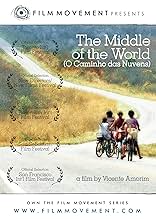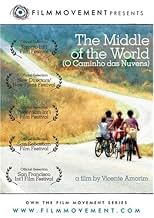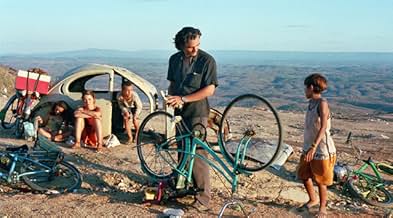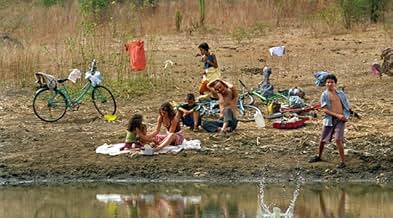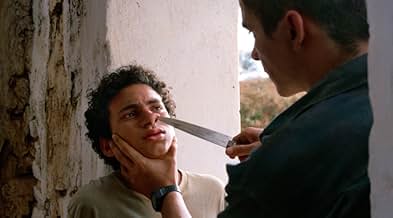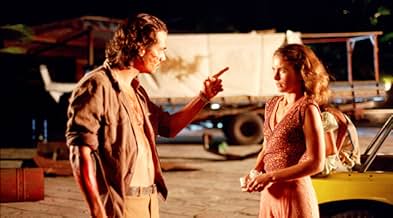IMDb RATING
6.5/10
1.3K
YOUR RATING
A man and his family travel 3200km (1984 miles) by bicycle, from the State of Paraíba to Rio de Janeiro, Brazil, in search of a job.A man and his family travel 3200km (1984 miles) by bicycle, from the State of Paraíba to Rio de Janeiro, Brazil, in search of a job.A man and his family travel 3200km (1984 miles) by bicycle, from the State of Paraíba to Rio de Janeiro, Brazil, in search of a job.
- Awards
- 1 win & 9 nominations total
Manoel Sebastião Alves Filho
- Rodney
- (as Manoel Sebastião)
Felipe Newton Silva Rodrigues
- Clévis
- (as Felipe Newton)
Cícera Cristina Almino de Lima
- Suelena
- (as Cristina de Lima)
Cícero Wesley A. Ferreira
- Cícero
- (as Cicero Wallyson e Ciceero Wesley)
Alexandre Zacchia
- Porfirio
- (as Alexandre Zachia)
- Director
- Writer
- All cast & crew
- Production, box office & more at IMDbPro
6.51.2K
1
2
3
4
5
6
7
8
9
10
Featured reviews
10lexicon8
A magical and heart-warming voyage through the heart of Brazil.
I loved this movie!
It is so refreshing to watch a non-pretentious film that illustrates the realities of poverty and the search for happiness without making you want to jump out of the nearest window!
Normally, Latin American directors tend to emphasize and exoticize poverty-stricken towns and characters by dwelling on the families' strife and hardship in order to extract superficial emotion from the spectator. Mr. Amorim, however, deftly maneuvers around these themes with a sincere and compassionate and humanistic eye.
"O Caminho das Nuvens" is a funny and modern road-movie that takes you where you want to go...places you may have been before, but may not have seen in such a fresh and authentic way. Muito bom.
It is so refreshing to watch a non-pretentious film that illustrates the realities of poverty and the search for happiness without making you want to jump out of the nearest window!
Normally, Latin American directors tend to emphasize and exoticize poverty-stricken towns and characters by dwelling on the families' strife and hardship in order to extract superficial emotion from the spectator. Mr. Amorim, however, deftly maneuvers around these themes with a sincere and compassionate and humanistic eye.
"O Caminho das Nuvens" is a funny and modern road-movie that takes you where you want to go...places you may have been before, but may not have seen in such a fresh and authentic way. Muito bom.
Life's about the Journey, Not the Destination...
Part "Road Movie" and part "Coming-of-Age" film, "O Caminho Das Nuvens" is an enjoyable little Brazilian flick that tells us the story of Ramao, his wife Rose, and their 5 children, as they make their way from "The Middle of the World" in Paraíba to Rio de Janeiro, on bikes, in search of work and a place to settle down.
Shot in Neorealist tradition- similar to film's like De Sica's "Bicycle Thief"- we are not shown the beginning of the family's journey, nor it's conclusion...but, rather, are offered a privileged glimpse into a "slice of (this poor family's) life".
The characters are real/regular people, and as such, could represent any one of the countless number of families' that have made similar journeys from rural Brazil to major urban centers like Rio and Sao Paolo, in search of new oppourtunities and a "better life".
From the start, we are privy to the fact that the family has no set destination, little direction, and even less money to survive on. It seems that Ramao has dragged his family on this epic excursion based on a whim, and a slightly psychopathic desire to find a job that pays "1000 reisas a month"- which he feels he will need in order to take care of his large family.
We follow Ramao and his family and observe the trials and tribulations that they must endure during the six month exodus they have embarked on...
To get by the family relies on the generosity of others...begging, panhandling, busking and doing odd jobs that will earn them enough cash to keep food in their bellies. Ramao acts quite callously toward his family, for a man that relies on them for money and survival. These feelings of inadequacy are likely a consequence of his inability to provide for his family.
Tension starts to develop between Ramao, his wife, and their eldest son Antonio, as Ramao repeatedly refuses job oppourtunities that do not meet his moral or monetary expectations. This is exacerbated when he decides to extend their journey, despite pleas from his tired and hungry family.
As Ramao comes to grips with the fact that his dreams and expectations are, in all likelihood, not going to be realized, the film begins to focus on the relationship with his teenage son Antonio.
At the beginning of the film, Ramao treats Antonio like he is an unwanted burden- constantly putting him down- though it seems the family wouldn't be as safe without him. We watch as Antonio becomes more independent; getting his coming-of-age experiences at various stops made by the family along the way. By the second half of the film it becomes clear that, despite their somewhat tenuous relationship, Ramao has been trying to get Antonio ready for life on his own.
As the family nears their next (final?) destination, the film goes out on an emotional note....though we never do find out what fate has in store for them. I guess this is a comment on, "life being about the journey, not the destination".
"The Middle of the World" is a simple, heartwarming film about a family on a journey. The locations and cinematography are beautiful and the acting is pretty good. It's also worth mentioning that the actor playing Ramao (Wagner Moura) looks a helluva lot like Johnny Depp!!! Definitely worth a watch, 6.5 out of 10.
Shot in Neorealist tradition- similar to film's like De Sica's "Bicycle Thief"- we are not shown the beginning of the family's journey, nor it's conclusion...but, rather, are offered a privileged glimpse into a "slice of (this poor family's) life".
The characters are real/regular people, and as such, could represent any one of the countless number of families' that have made similar journeys from rural Brazil to major urban centers like Rio and Sao Paolo, in search of new oppourtunities and a "better life".
From the start, we are privy to the fact that the family has no set destination, little direction, and even less money to survive on. It seems that Ramao has dragged his family on this epic excursion based on a whim, and a slightly psychopathic desire to find a job that pays "1000 reisas a month"- which he feels he will need in order to take care of his large family.
We follow Ramao and his family and observe the trials and tribulations that they must endure during the six month exodus they have embarked on...
To get by the family relies on the generosity of others...begging, panhandling, busking and doing odd jobs that will earn them enough cash to keep food in their bellies. Ramao acts quite callously toward his family, for a man that relies on them for money and survival. These feelings of inadequacy are likely a consequence of his inability to provide for his family.
Tension starts to develop between Ramao, his wife, and their eldest son Antonio, as Ramao repeatedly refuses job oppourtunities that do not meet his moral or monetary expectations. This is exacerbated when he decides to extend their journey, despite pleas from his tired and hungry family.
As Ramao comes to grips with the fact that his dreams and expectations are, in all likelihood, not going to be realized, the film begins to focus on the relationship with his teenage son Antonio.
At the beginning of the film, Ramao treats Antonio like he is an unwanted burden- constantly putting him down- though it seems the family wouldn't be as safe without him. We watch as Antonio becomes more independent; getting his coming-of-age experiences at various stops made by the family along the way. By the second half of the film it becomes clear that, despite their somewhat tenuous relationship, Ramao has been trying to get Antonio ready for life on his own.
As the family nears their next (final?) destination, the film goes out on an emotional note....though we never do find out what fate has in store for them. I guess this is a comment on, "life being about the journey, not the destination".
"The Middle of the World" is a simple, heartwarming film about a family on a journey. The locations and cinematography are beautiful and the acting is pretty good. It's also worth mentioning that the actor playing Ramao (Wagner Moura) looks a helluva lot like Johnny Depp!!! Definitely worth a watch, 6.5 out of 10.
A Great Brazilian Movie
A great Brazilian movie called "The Middle of the World", which, in fact, it is in so many ways. It is a rich but unpretentious chronicle of an extraordinary journey of one rural Brazilian family. The father is illiterate and unable to find work. Romão (the father), Rose(the mother), and their five children, from a teen to a baby, begin to make a journey on bicycles and head for Rio de Janeiro, which is 2,000 miles away, to find work. They face all kinds of physical and emotional hardships along the way, seeing many kinds of villages, dirt roads and superhighways, and desolate to spell binding scenes of nature. They beg, do odd jobs, sing in outdoor cafés for money, scrounge around in old abandoned homes, swelter under the blazing sun, almost die of thirst, and sleep under the stars; yet all the while, they keep trying to survive and maintain their love for each other, which is often tested beyond limits. The husband and wife relationship has classic features that are displayed poignantly and expertly. They exhibit a kind of yin and yang pattern with Romão being a strong, soft spoken, intensely patient, idealistic optimist and Rose being the one who verbalizes their feelings of love, sympathy, joy, as well as despair, fear, and anguish. She is also outspoken when their frailties have been overtaxed and when there is a need to be practical. Her pragmatism and his religious convictions balance each other out. Nevertheless, they are able to switch roles as the one to comfort, encourage, or recommit to the challenge when either has had enough and is losing hope and faith in their vision. With no competition from age-group peers, the character of their parents seems to be emulated as role models by the children. As a sub-plot, the teenager, Antonio, is in the middle of growing into manhood. The Father, Romão, exercises patient parental control through mild rebukes and testing Antonio's mettle by letting him use his judgment and make mistakes, but he also subtly guides him with silent looks of acknowledgement that builds Antonio's confidence in himself. Rose, the mother, gives equal guidance by emphasizing caution and protectiveness but also gives him a sense of profound mother-love that becomes his foundation of security. When the father senses Antonio is ready to emancipate, the mother does not want to let go and the father, in his wisdom-love, states simply and firmly to Rose, "We do not own our children." When Antonio is left behind to follow an occupation, the strong and positive family dynamic continues to the end of their journey. Finally, when at their destination of Rio de Janeiro, and expressing the powerful spirit of this family, their triumph is symbolized in a mountain top experience as they stand together viewing Corcovado's Statue of the Christ and overlook the prize of their victory, the city of their dreams. As they crossed the 2,000 miles of their courageous journey, they witnessed the many ways in which the nation they once knew is rapidly changing. It was a raw, earthy, beautiful story. It gave such a realistic picture of Brazil as a whole. It is a beautiful country but also has such vast differences between the rich and poor. The movie also showed what a big and truly dominant role religion, and religious superstitions, plays in the lives of the poor, illiterate 'peasants'. At 'The Middle of the World', two different worlds, the new cosmopolitan and the old world, stand on the same piece of earth!
A very touching movie!
Just saw the movie and was touched and traumatized. Beautifully made and very realistic.
At first I got the idea of a visionary hard working father that wants to provide for his wife and children,soon to find out he is not...
Those 5 kids just wonderful! All 5 of them!
I loved the way they would all take turns caring for their little brother... The way they sang together with their mom in the middle of nowhere...and making the best out of the circumstances. Enjoyed the "rebel" on the older son and his failures...
The mother was very talented just a bit too naive and submissive...maybe too in love with the looser...
What did not sit well at all with me was how the father would let his family beg all along but would be ashamed of a little add job he got (temporary) where he could have earned at least a meal for his kids and not let them go to sleep hungry...
The movie is dedicated to Roberto Carlos ( as in the singer)? and why would that be for?
At first I got the idea of a visionary hard working father that wants to provide for his wife and children,soon to find out he is not...
Those 5 kids just wonderful! All 5 of them!
I loved the way they would all take turns caring for their little brother... The way they sang together with their mom in the middle of nowhere...and making the best out of the circumstances. Enjoyed the "rebel" on the older son and his failures...
The mother was very talented just a bit too naive and submissive...maybe too in love with the looser...
What did not sit well at all with me was how the father would let his family beg all along but would be ashamed of a little add job he got (temporary) where he could have earned at least a meal for his kids and not let them go to sleep hungry...
The movie is dedicated to Roberto Carlos ( as in the singer)? and why would that be for?
The road to Rio
This is a hypnotic Brazilian film. Directed by Vicente Amorim, it's set in the wide open expanses of the North of the country as a poor family is seen traveling toward Rio on bicycles. The movie gives us a sense of the enormity of some of the arid landscape the family traverses in order to get to a place where the father, Romao, could get a decent job that would pay him, at least, a sum, that in his mind will be enough to take care of his wife and five children.
The movie is made so appealing by the cinematography of Gustavo Hadba, whose camera loves to show the emptiness of the regions the family is seen traversing. The music of Andre Abujamra blends perfectly with the action.
The only thing that is incomprehensible is the way that Romao will not try to get a job, doing whatever, to support his family. Romao is a stoic father who believes his problems will be solved when they arrive in Rio, but along the way, he shows he is a beaten man who will let his family perform for whatever coins are thrown at them, and even starve, without moving a finger to remedy the situation. At the same time, Romao shows a faith in the miraculous Father Cicero, whose sanctuary they visit along the way, but alas, when opportunities arise, Romao doesn't take advantage of them.
The suffering mother Rosa is a model of loyalty to her husband. Even if she knows that it's because of Romao they are in the position one sees them. Antonio, the oldest son, is clearly an intelligent boy who will make it in life because he appears to have a resolve that will fight to survive.
The director got good performances all around from his cast. Wagner Moura, Claudia Abreu and Ravi Ramos Lacerda, the three principals, are perfect in their roles.
The film will not disappoint because it shows a good director at the helm.
The movie is made so appealing by the cinematography of Gustavo Hadba, whose camera loves to show the emptiness of the regions the family is seen traversing. The music of Andre Abujamra blends perfectly with the action.
The only thing that is incomprehensible is the way that Romao will not try to get a job, doing whatever, to support his family. Romao is a stoic father who believes his problems will be solved when they arrive in Rio, but along the way, he shows he is a beaten man who will let his family perform for whatever coins are thrown at them, and even starve, without moving a finger to remedy the situation. At the same time, Romao shows a faith in the miraculous Father Cicero, whose sanctuary they visit along the way, but alas, when opportunities arise, Romao doesn't take advantage of them.
The suffering mother Rosa is a model of loyalty to her husband. Even if she knows that it's because of Romao they are in the position one sees them. Antonio, the oldest son, is clearly an intelligent boy who will make it in life because he appears to have a resolve that will fight to survive.
The director got good performances all around from his cast. Wagner Moura, Claudia Abreu and Ravi Ramos Lacerda, the three principals, are perfect in their roles.
The film will not disappoint because it shows a good director at the helm.
Did you know
- TriviaCarol Castro's debut.
- ConnectionsReferenced in A Dona da História (2004)
Details
- Release date
- Country of origin
- Official site
- Languages
- Also known as
- The Path of the Clouds
- Filming locations
- Production companies
- See more company credits at IMDbPro
Box office
- Gross worldwide
- $13,278
- Runtime
- 1h 25m(85 min)
- Color
- Sound mix
- Aspect ratio
- 1.66 : 1
Contribute to this page
Suggest an edit or add missing content


